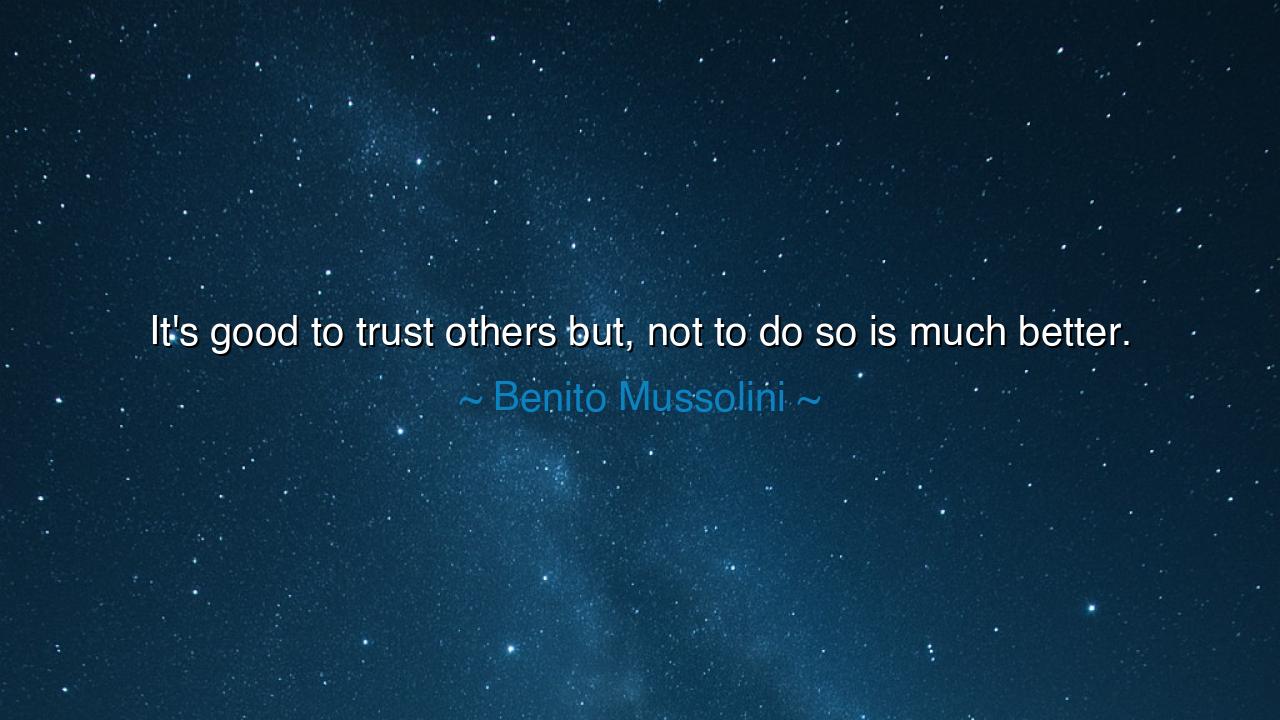
It's good to trust others but, not to do so is much better.






The words of Benito Mussolini—“It’s good to trust others but, not to do so is much better”—carry the sharp edge of cynicism born from the harsh arena of politics and power. Though spoken by a man whose legacy is marred by tyranny, the quote unveils a truth about human dealings: that trust is precious, yet dangerous; necessary for life, yet perilous when granted too freely. Mussolini, a ruler who lived in a world of betrayal and ambition, believed that the path of survival demanded suspicion over faith, caution over confidence. His words are not gentle counsel, but the battle-hardened cry of one who saw trust as weakness in the ruthless game of power.
The origin of this thought lies in Mussolini’s own rise and fall. As dictator of Italy, he was surrounded by allies whose loyalty often wavered, generals whose promises faltered, and foreign powers whose assurances crumbled into deceit. In such an environment, trust became a currency too costly to spend. His reflection that it is “better” not to trust reveals both his fear and his realism: he understood the frailty of human loyalty and the swiftness with which men betray when their interests change. Thus, his words are forged in the fire of political intrigue, where misplaced trust often meant ruin.
Yet, beyond Mussolini himself, history illustrates the double-edged nature of this teaching. Consider Julius Caesar, who trusted Brutus, only to be struck down by him in the Senate. His faith in friendship blinded him to betrayal, and his fall became immortalized in the lament, “Et tu, Brute?” Here we see Mussolini’s warning in action: trust can be noble, but misplaced trust can destroy even the greatest of leaders. Caesar’s tragedy teaches us that to walk blindly in faith without vigilance is to invite disaster.
But there is also another side to the story. Too much suspicion corrodes the soul and destroys unity. History is filled with tyrants who trusted no one, building walls of fear around themselves until isolation consumed them. Stalin trusted so little that he turned upon his own allies, purging even the faithful. His lack of trust protected him from betrayal for a time, but it left behind rivers of blood and a legacy of terror. In this, we learn that Mussolini’s wisdom, though sharp, is incomplete—for a world without trust becomes a world without love, without cooperation, without the bonds that hold society together.
The deeper meaning of the quote, then, is not a command to abandon trust entirely, but a caution to guard it with discernment. To trust others is necessary for building families, friendships, and nations. But to do so with open eyes, tempered by wisdom, is far better than blind faith. The wise soul does not reject trust, but places it carefully, testing loyalty, watching deeds more than listening to words. Thus, the strength lies not in cynicism, but in prudence: to trust, but never without vigilance.
The lesson for us is clear: give trust as a gift, not as an assumption. In your dealings, be slow to promise and careful in whom you believe. Value actions above speeches, consistency above charisma. When trust is broken, do not let bitterness consume you, but learn and guard yourself more wisely. And when you find those rare souls who prove faithful across time and trial, honor them, for they are treasures rarer than gold.
Practically, let us live with balanced hearts. In business, demand proof before giving confidence. In leadership, trust your people but build systems of accountability. In friendships and love, trust openly, but do not be blind to warning signs. In this way, we walk the narrow road between suspicion and naiveté, between the isolation of distrust and the ruin of misplaced faith.
Thus, Mussolini’s words remain a stern warning for all generations: “It’s good to trust others but, not to do so is much better.” Let us not embrace them as the whole truth, but as a fragment of wisdom wrapped in iron. For trust is both the strength and the vulnerability of mankind. To wield it wisely is to walk as the ancients counseled—with eyes wide open, hearts guarded, yet still capable of recognizing loyalty when it appears like a rare star in the night sky.






AAdministratorAdministrator
Welcome, honored guests. Please leave a comment, we will respond soon